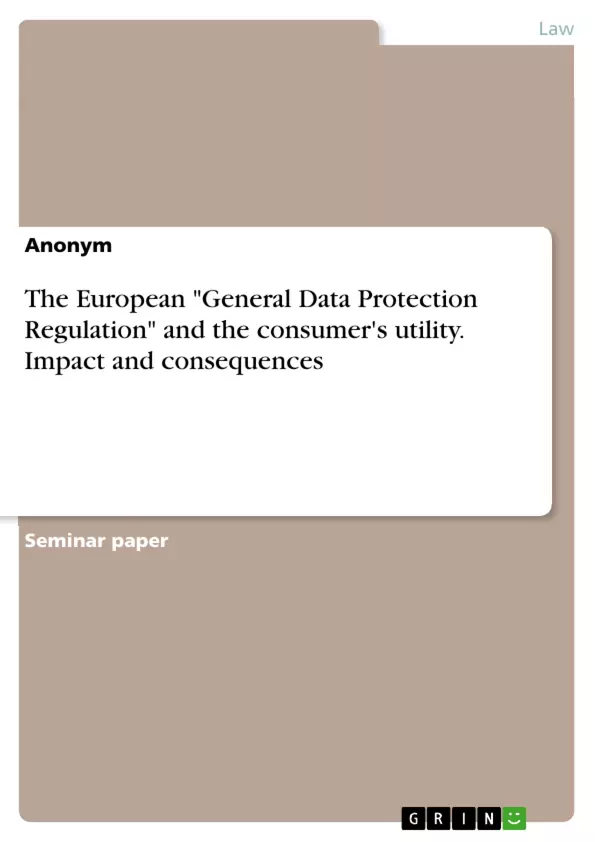This paper aims to conduct a critical literature review on the main research question: Does the European General Data Protection Regulation increase consumer's utility by increasing privacy protection?
The paper is structured as follows in chapter 2.1, a systematic framework of the notion of privacy and privacy protection will be described. Afterwards, the paper will study which kind of personal data is collected, data collection technologies such as user log-in information, cookies or IP address, and the usage process of personal data.
Then, in chapter 2.3, the command and control policy is considered a consumer policy instrument to determine how the consumer can benefit from the command and control policy and how the government can set limitations about the level of privacy protection and consumer's welfare. The last chapter 2.4 presents the significant articles of the law European General Data Protection Regulation (EU GDPR) for privacy protection and the consequences for non-compliance with the EU GDPR.
In the main part, the research tries to answer the following questions split in chapters 3.1 and 3.2: How can we reduce privacy concerns? Can a privacy protection law like the EU GDPR lower privacy concerns and protect the welfare of the consumer?
This paper sets out the main arguments for introducing consumers’ privacy concerns, privacy paradox, and consumer's utility regarding consumer welfare to answer the questions as mentioned above. Finally, the paper will summarise the findings and a concluding solution to the research question.
Edward Snowden's disclosures regarding the surveillance practices of the National Security Agency (NSA) and the Facebook-Cambridge Analytica affair, in which data from up to 87 million Facebook users were illegally collected. These both cases were the largest personal data scandal in the past years. The violations of privacy protection create enormous concerns, not only for the affected firms but also for their customers. Depending on the firm, the stolen data can range from relatively harmless information to extremely personal data. Besides that, a breach of privacy rights will cost a lot of money to remediate and do serious harm to a firm's credibility and reputation. These examples have sent alarming signals to governments, firms, consumer policy, and consumers to address the problem of personal processing data and privacy protection.
Inhaltsverzeichnis (Table of Contents)
- Introduction
- Theoretical Foundations
- Definition of privacy and privacy protection
- Personal data collection of consumers and usage process
- Consumer policy instrument: Command and control policy
- Privacy protection law the European General Data Protection Regulation
- Implications of the privacy protection law the European General Data Protection Regulation
- Consumers' privacy concerns and privacy paradox
- Consumer's utility on the European General Data Protection Regulation
- Conclusion
Zielsetzung und Themenschwerpunkte (Objectives and Key Themes)
This paper aims to critically examine the impact of the European General Data Protection Regulation (EU GDPR) on consumer utility by analyzing its effect on privacy protection. The paper investigates whether the EU GDPR enhances consumer welfare by reducing privacy concerns and increasing data control.
- Defining privacy and privacy protection in the context of digital data collection
- Exploring the types of personal data collected from consumers and the associated usage processes
- Evaluating the effectiveness of command and control policies as consumer protection instruments
- Analyzing the provisions of the EU GDPR and its potential to enhance privacy protection
- Assessing the impact of the EU GDPR on consumer privacy concerns and their perception of utility
Zusammenfassung der Kapitel (Chapter Summaries)
- Introduction: This chapter introduces the research question, which focuses on the potential of the EU GDPR to increase consumer utility by strengthening privacy protection. It highlights the importance of addressing privacy concerns in the digital age, particularly in light of recent data scandals.
- Theoretical Foundations: This chapter provides a comprehensive framework for understanding privacy and privacy protection. It defines these concepts, explores the various types of personal data collected from consumers, and examines the role of command and control policies in safeguarding consumer interests.
- Implications of the privacy protection law the European General Data Protection Regulation: This chapter examines the potential impact of the EU GDPR on consumer privacy concerns and their perception of utility. It explores the implications of the regulation for addressing the privacy paradox, which is the phenomenon where consumers express concerns about privacy but engage in behaviors that compromise their privacy.
Schlüsselwörter (Keywords)
This paper delves into the critical areas of privacy protection, personal data collection, consumer utility, and the EU GDPR. The research focuses on exploring the relationship between consumer privacy concerns and the effectiveness of data protection regulations in enhancing consumer welfare.
- Arbeit zitieren
- Anonym (Autor:in), 2018, The European "General Data Protection Regulation" and the consumer's utility. Impact and consequences, München, GRIN Verlag, https://www.hausarbeiten.de/document/1022269


